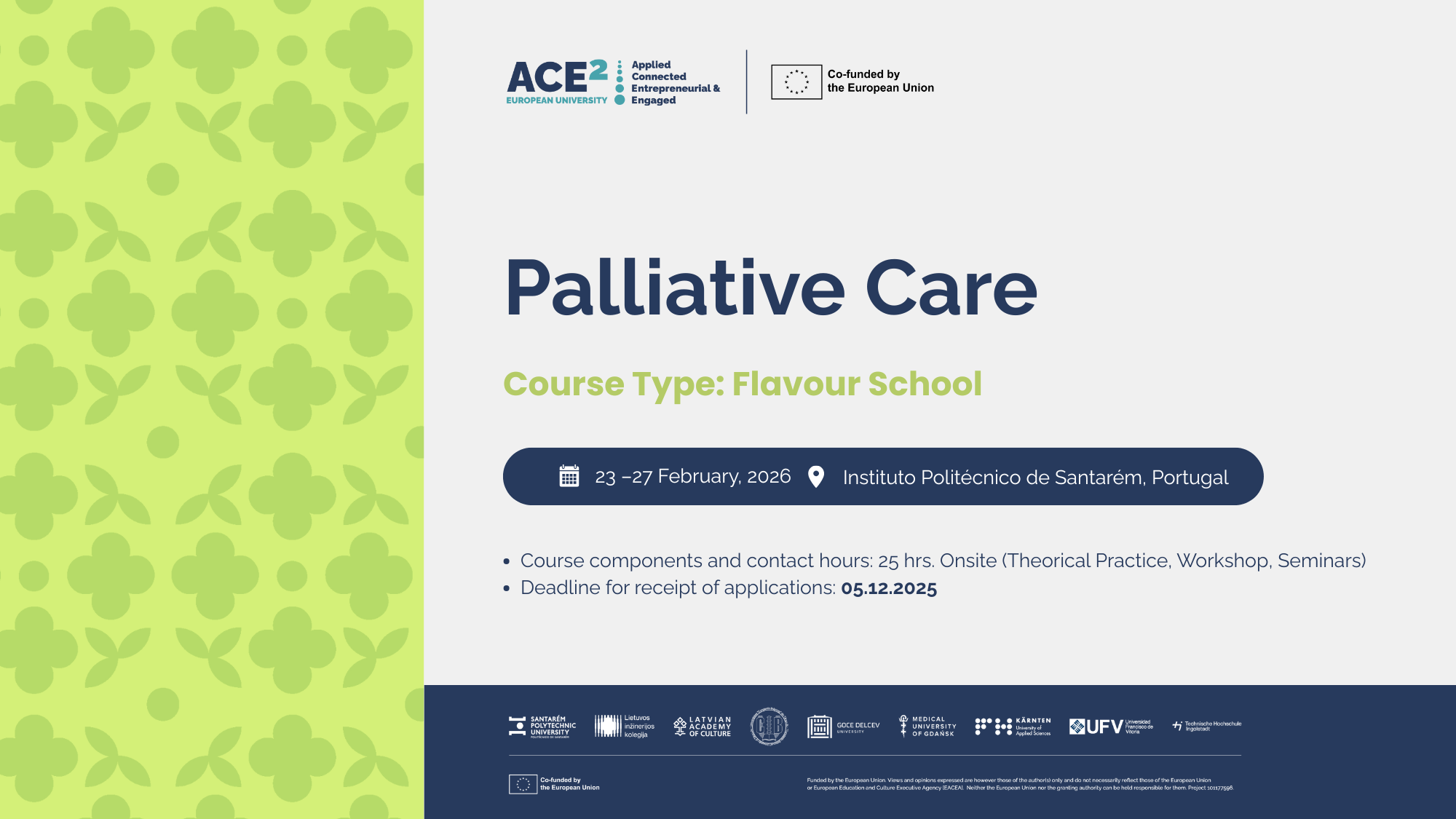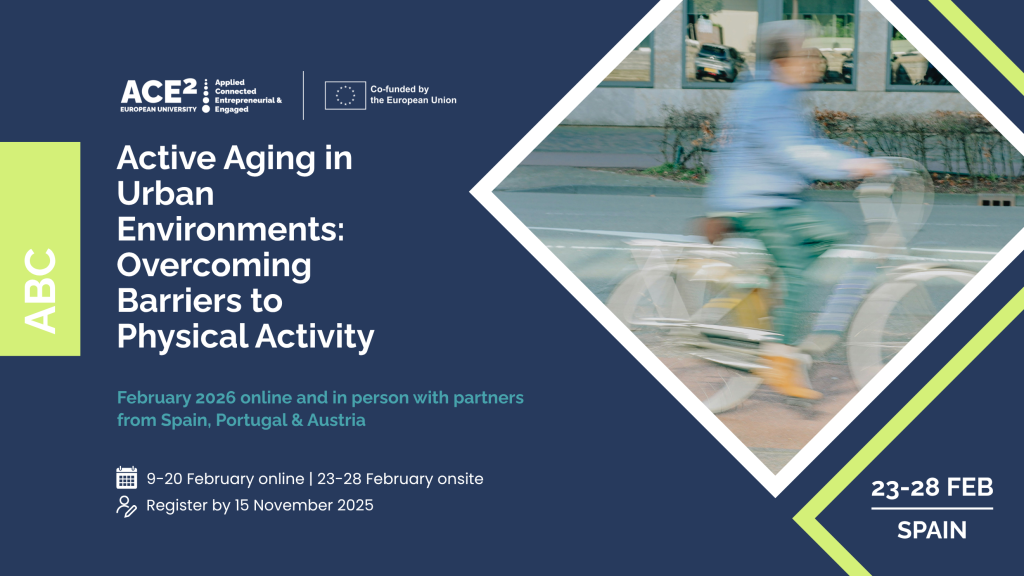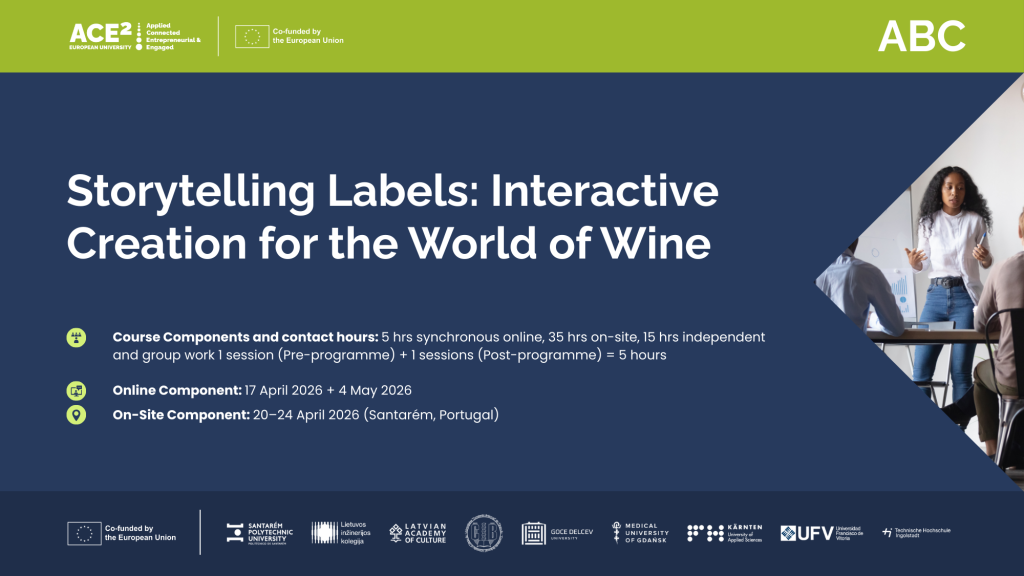
Palliative Care

Course Type: Flavour School
Flavour Schools are short, immersive five-day summer or winter schools developed within the ACE²-EU Alliance under the WP2 – APP Factory. They bring together students from across the partner universities for intensive programmes combining academic learning, experiential workshops, and collaborative projects.
Each edition focuses on real-world challenges identified by external stakeholders, connected to the UN Sustainable Development Goals, and designed to foster interdisciplinary teamwork, creativity, and critical thinking.
They aim to promote European values, intercultural dialogue, and social responsibility, empowering students to become agents of positive change in their professional and community contexts.
In this context, the Palliative Care Flavour School will invite students to explore, through teamwork and applied practice, how health professionals can respond to end-of-life needs with empathy, ethical reflection, and interdisciplinary collaboration, fostering a deeper understanding of holistic and compassionate care.
Duration and Timeline:
Course components and contact hours: 25 hrs On site theorical practice ; Workshop, seminars
- On site component: 23 – 27 February 2026, Period of Time (FROM MONDAY TO FRIDAY)
Award, Credits and Certification
On successful completion of the course participants will receive 1 ECTS credits and a certificate of attendance
Organised by:
Instituto Politécnico de Santarém (Portugal ) Instituto Politécnico de Santarém
- Lígia Eduarda Pereira Monterroso (IP Santarém)
- Maria José Nogueira (IP Santarém)
- Isilda Ferreira (IP Santarém)
- Marta Rosa (IP Santarém)
- Helena Caseiro (IP Santarém)
- Goce Delcev University (Macedonia)
- Daniela Baklioska (GDU)
External stakeholders that will be involved in the course:
- Santarém City Council
- Palliative Care Unit
- Leziria Local Health Unit (Sónia Malaca; Yahia Abuowda)
Course Description and Learning Objectives
“Palliative Care (PC) is a holistic, active health care that seeks to improve the quality of life of patients and their families/caregivers by preventing and alleviating suffering, through early identification, diagnosis and appropriate treatment of pain and other problems, whether physical, psychological, social or spiritual (WHO).
They are integrated care, provided by an interdisciplinary team and are based on ethical principles and advance care planning, so they do not anticipate or prolong the dying process.
They actively involve family members/caregivers in crisis prevention, empowering and supporting them in grief, in a personalized way, for adults and children, as needed.
In PC, the person is considered as the axis of care, with active participation in communication and decision-making processes, ensuring respect for their autonomy, opinions, values and rights”.
Course Description:
Provide a more structured explanation of the course, dividing it into its main components:
- On-site sessions:
During the onsite week, participants engage in an integrated learning experience that combines theoretical input, problem-based learning (PBL), and cooperative group work. The programme progressively moves from understanding the principles and scope of palliative care to exploring its practical, ethical, and communicative dimensions. Early sessions introduce the philosophy of palliative care, the needs of patients and families, and the functioning of palliative care units. As the week advances, participants work collaboratively on cases addressing symptom management, communication with patients and families, and ethical decision-making in end-of-life situations. The course concludes with activities focused on teamwork and interdisciplinarity, where participants reflect on their learning outcomes and share insights through collective discussion and a cultural exchange moment.
Follow-up / reflection: During this week, group activities will be proposed so that students can interact with each other, discuss topics, and present to the other participants in class. Course evaluation will be based on attendance at the proposed activities and completion of a satisfaction questionnaire.
Specific learning objectives include:
- Describe and understand the care to be provided to the person and family in the last days/hours of life;
- Know and understand the basic aspects of communication with people at the end of life;
- Identify problematic and frequent situations in communication with end-of-life people and their families;
- Develop a critical analysis and reflect on complex situations from an ethical point of view in palliative care;
- Valuing interdisciplinarity teamwork in palliative care.
By the end of the course, students will be able to:
- Apply informational knowledge and
- Understand and describe the care needed for patients and families in the last days/hours of life;
- Show basic skills in communication at the end of life;
- Recognize common challenges in communication with patients and families;
- Critically reflect on complex ethical issues in palliative care;
- Value and engage in interdisciplinary teamwork in palliative care
Which students would find this course useful for them?
This course may be suitable for students from ACE2-EU partner universities:
- Any area
This course may be suitable for those who have an interest in:
This course may be suitable for those who have an interest in caring for patients and families at the end of life, improving communication skills, understanding ethical issues in palliative care, and working as part of an interdisciplinary team
- Recommended Language Level :
- Basic to intermediate level of English (B1-B2), as the working language will be English
Application Process:
Interested applicants should
🔗 Apply here: https://forms.gle/BQ29LgJeXaF5ku158
Deadline for receipt of applications: 5 December 2025
A notification of acceptance to participate will be sent to successful applicant (an acceptance letter will be sent by the host institution and will include program registration details)
Further Information
For any further information or queries related to the course, please contact:
Email: ligia.monterroso@essaude.ipsantarem.pt



